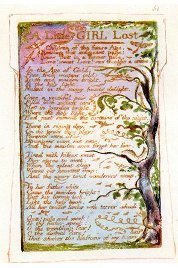Songs of Innocence and Experience Contents
A Little Girl Lost - Synopsis and commentary
Synopsis of A Little Girl Lost

The poem begins with a prologue in the voice of a prophet. He speaks to people of a future time, telling them that in the past love was considered a crime. By putting the poem's present time into this context, he suggests that it represents a primitive age whose repressive ideas have now been surpassed. He then tells the story.
In the Golden Age, young women and men are naked and without shame. A young couple meet in a garden, alone and far from parental sight. They begin to ‘play' sexually but innocently. Their growing desires, however, make them tired of this and they agree to meet secretly at night. Following this, the girl goes to her father. His loving look inspires in her the same terror that the ‘holy book' evokes. He asks her to explain herself and tells her of the fear and anxiety that she causes him.
Commentary
Time frame
- The ‘former time' of which the prologue speaks is Blake's own day
- The ‘Golden Age' is a term usually applied to the ancient time of the gods in classical Greece. However, in Blake's thought, it is not restricted to the past. The lovers' meeting is a:
Present corruption
For Blake, the Golden Age can exist in the present world, if people are not governed by shame and fear. However, the present world corrupts them. Although he sees the young people in the poem as innocent, their innocence is overshadowed by the existence of parental authority and the judgement of outsiders: ‘Parents were afar' and ‘Strangers came not near'.
Light and dark
This corruption is further conveyed through the imagery – of bright dawning day and of night when ‘weary tired wanderers weep':
- When the lovers first meet, they are in daylight, earlier termed ‘holy'. Nothing they do needs to be hidden and it is associated with the brightness and the life-giving qualities of light
- However, the young woman is aware of parents and strangers, who are associated with her fear. Consequently, the young couple are forced into secrecy, hiding their union in the darkness of night
- Night is not named but is given negative associations. It is the time for grief in those who are exhausted and drained of life, not only ‘weary' but ‘weary and tired'.
The loss of innocence
Given the context of love in a garden, the image of wanderers evokes Adam and Eve. After their expulsion from the Garden of Eden, they are wanderers who now know the meaning of shame. Blake is alluding to how the couple in the poem are compromised. Ona completes her ‘Fall' when she feels terror and guilt in her father's presence. She is no longer innocent but is now ruled by the possessive, prohibition-laden and manipulative love of her father.
Investigating A Little Girl Lost
- Compare this figure of Ona with Lyca in The Little Girl Lost
- What similarities and differences do you find?
Recently Viewed
Related material
Scan and go

Scan on your mobile for direct link.